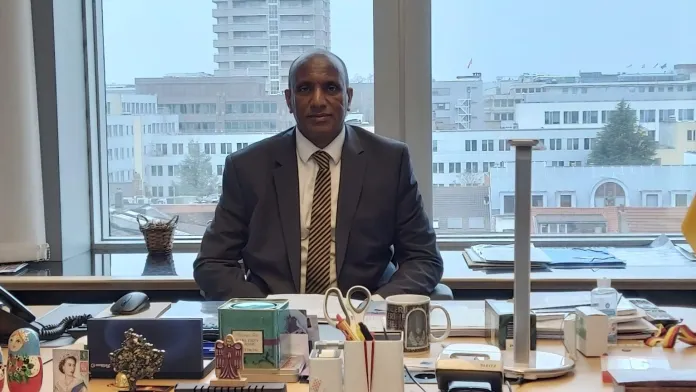In addition to securing new EU projects, my first priority is to build good relations with EU decision-makers stated head of the Brussels’ office of Somaliland.
Ambassador Kaysar Maxamed is a veteran diplomat. Previously he held various positions including a deputy Minister of Foreign Affairs of Somaliland. The President of the Republic of Somaliland, HE Muse Bihi Abdi appointed him as the ambassador of Somaliland to the European Union in January this year. We talked about the peace possibilities of Somaliland and the country’s future. – writes Endre Barcs.
Q: Somaliland declared independence after the overthrow of Somali military dictator Siad Barre in 1991, but the life of the people in the country is not easy as the Republic of Somaliland is under constant attack by multiple terroristic forces, unionist groups as well as armed and hostile clan militias. What are the common goals of these anti-Somaliland forces?
A: Though not internationally recognised, Somaliland has a working political system, strong government institutions, a police force and its own currency. All those crime-in-partner groups attacking us are actively sponsored and incited by some traditional leaders from Sool who at the moment clearly changed into clan warlords. Their aim is to disturb and disintegrate the peace, stability, and development that Somaliland had been building for the last 30 years, and
to cause reputational damage on Somaliland’s international standing as the most peaceful country in the Horn of Africa. These anti-Somaliland forces will not stand for long as people and country of Somaliland become stronger and more resilient to stop them. The Somaliland National Army is strong enough to defend the country and its sovereignty.
Q: Peace can only regain by force?
A: Not at all! The government of Somaliland is ready to sit with the leaders of Sool region and to stop conflict by negotiations. The government has already agreed unconditional ceasefire and calling the citizens return their homes.
Q: Somaliland as it is not a recognized country yet, and foreign investors might think that doing business in such a place is going to be a difficult and daunting task. Is it so?
A: The Economic System of Somaliland is a free market system based on supply and demand with no Government control. Somaliland enjoys open market policies that are designed to eliminate discrimination against foreign investors, business projects, investments and financial transactions.
The aim of Somaliland’s government to show the world the potential advantage that Somaliland’s strategic location holds in the Horn of Africa for business, development, and trade for landlocked countries in Africa. Somaliland is a country with large economic potential and immense business opportunities for the development of new markets. Besides the fact that it is blessed with numerous natural resources, a fast expanding economy and a growing middle class, it is also well known for the exceptional hospitality of its inhabitants.
Somaliland maintains a strong system of investment rights and a straight forward corporate law where investors will get adequate protection and benefit for their investments. However, Somaliland generates a resilient infrastructure for all investment although providing the strong growth and security needed. There are international companies who know this very well, as global brands are already in the country. Due to the attractive opportunities and appealing location I would like to encourage other international companies to invest in our country.
I just give you a good example. Somaliland government is currently engaging in negotiations with transit passage with Ethiopia. It has secured its largest foreign investment deal with UAE, including DP World’s rebuild and development of the port of Berbera in 2017. Berbera sits at the intersection of trade routes in the Red Sea, the Gulf of Aden and East Africa. The corridor road 242 from Berbera to the Ethiopian border at Wajaale currently is underway. Collectively, these investments will facilitate greater trade between the Somaliland and Ethiopia.
Q: Now, that after two years of COVID you have taken over again as head of Somaliland’s Brussels office, I assume his first priority will be to help the country get EU funding. What existing EU programs are already running in the country and in which areas do you want to access further EU funding?
A: Since its de facto independence, Somaliland has not been recognized by any state in the world. Nevertheless, and although it may be contradictory, Somaliland maintains relations with different states, actors and internal institutions. The European Union, although it does not formally recognize Somaliland as an independent country, does maintains relations with my country at different levels such as cooperation and development, military missions, promotion of democracy and good governance and even supports educational, health and gender programs in order to improve the living conditions of the region’s population.
Just giving you an example, within the frame of the EU project “Rebuilding confidence on land issues in Somalia” we received a total of 2.26 million Euro from the European Union in 2017. This program has been piloting in Somaliland to lay the foundation for effective reform in the land sector in terms of policies, legislations, regulations and institutional capacity to provide basic land services to the population, all of which are known to be important for peace and state building.
In addition to securing new EU projects, my first priority as head of the Brussels’ office of Somaliland is to build good relations with EU decision-makers, to whom I want to share the struggle my country has been through and fight for the official recognition of my country’s independence by all EU member states.
https://www.eureporter.co/world/somalia/2023/03/07/somaliland-achievements-and-goals/






































